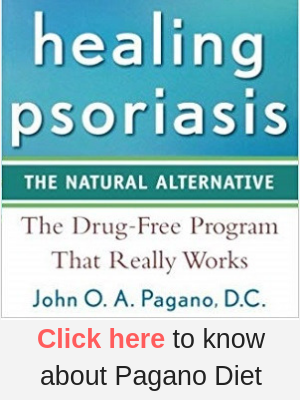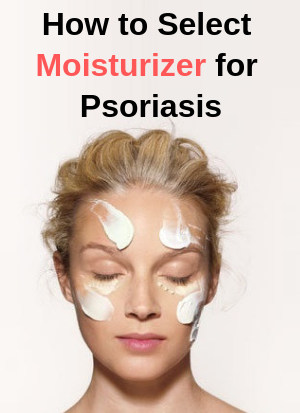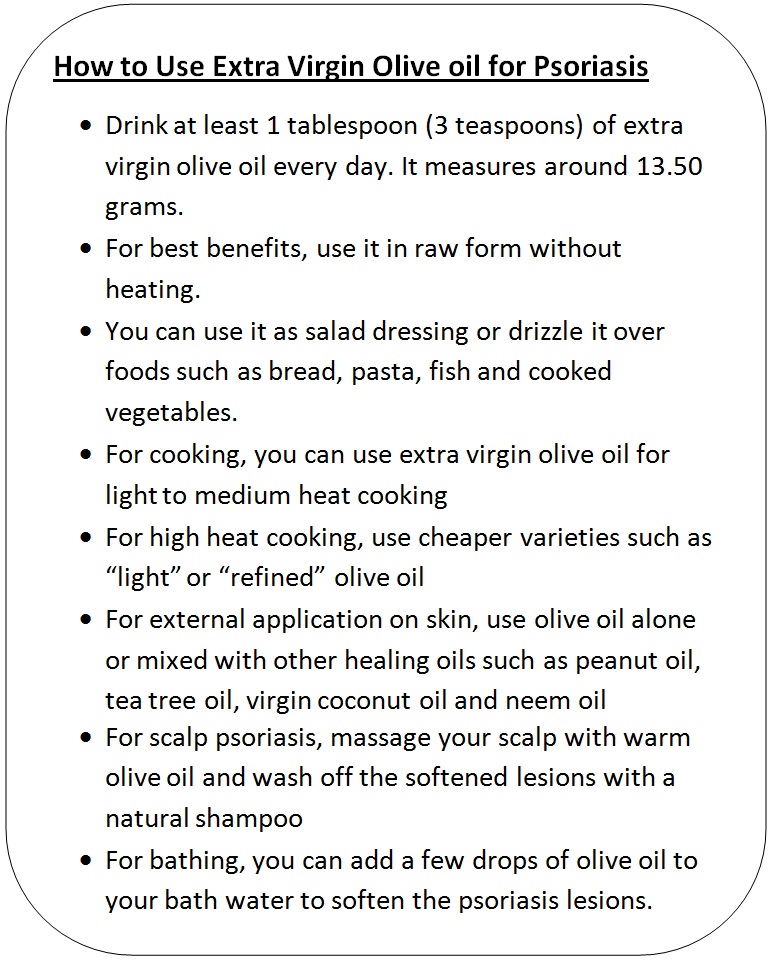Use of olive oil for psoriasis is not restricted to oral consumption, but it is an excellent topical oil for the psoriasis lesions also. In recent years, olive oil has become a popular choice among health conscious people- thanks to all the healthy fatty acids and antioxidants that it contains.
Dr John Pagano, author of the book “Psoriasis Healing: The Natural Alternative” is pretty high about this oil. He has recommended consuming one tablespoon per day of extra virgin olive oil in his very famous psoriasis healing diet protocol. He also recommends external application of olive oil on psoriasis lesions- alone or mixed peanut oil.
There are multiple ways to use olive oil for psoriasis healing:
- A rather cheap and effective moisturizer for psoriasis lesions
- Scalp massage oil to soften psoriasis flakes
- As a dietary fat to be used in raw form for salad dressing and drizzling it over food preparations such as pasta, bread and fish
- As the edible cooking oil for low to medium heat cooking
In this post, we would discuss all the health benefits of olive oil along with buying, storage and cooking instructions.
Let us know Olive Oil
Olive oil has been a staple food for Mediterranean people for centuries. Mediterranean diet is characterized by a high consumption of vegetables, fruits, whole foods, legumes, nuts and olive oil with moderate consumption of proteins in the form of fish and dairy. Red meat consumption is very occasional. People belonging to Mediterranean region are considered to have healthy skin and hairs with lesser heart problems, cancer and other complex diseases.
Mediterranean diet is also called as heart-healthy diet.
- A case study conducted in Spain covering 7447 old age people in the age range 55 to 80, without having any heart condition (but at the highest degree of risk for a cardiovascular disease) concludes that Mediterranean diet can reduce the risk of heart attack and stroke by almost 30%.
- Another case study, presented at the American College of Cardiology states that adults who follow Mediterranean diet are almost 47% less susceptible to heart diseases over a period of 10 years than those who don’t follow it closely.
When various research studies proved that Mediterranean people enjoys a comparatively healthy life with lesser complex issues- then health experts become curious in evaluating possible health benefits of olive oil because olive oil is an integral part of the Mediterranean diet. Since then, a number of studies have proven that olive oil consumption can help reduce various inflammatory responses in human body to avoid the risk of complex health disorders such as heart diseases, Cancer, Parkinson’s disease and Alzheimer’s disease.
A typical American diet consists of saturated and trans fats which can clog the heart arteries. On the other side, Mediterranean diet has olive oil as the predominant fat which is rich in monounsaturated fatty acids. It reduces the level of anti-clogging lipids in blood to reduce the chances of heart problems.
Olive oil is produced by pressing of olives- the fruit of the olive tree. Spain, Italy and Greece are the three biggest producer of olive oil worldwide. All these three countries belong to the Mediterranean region. In USA, California tops the list with other states such as Oregon, Texas, Arizona and Georgia only producing small quantities.
Why Extra Virgin Olive Oil
In this post, we are discussing only the benefits of Extra Virgin Olive oil. We are not talking about other varieties of olive oil such as virgin, light and refined. Extra virgin olive oil is manufactured by cold pressing of olive fruits without any use of external heat or chemicals to preserve all the intrinsic health benefits. Free fatty acid content in extra virgin olive oil is less than 0.8 grams per 100 grams.
The other versions of olive oil involves pressing of the olive pulp that is left after the first pressing. That’s why they contain lesser nutrients than extra virgin variety. For instance, virgin olive oil is produced by further pressing of the leftover olive pulps and it has fewer polyphenols than extra virgin variety. Free fatty acid content in virgin olive oil is less than 2 grams per 100 grams. Other varieties (like refined and light) involve chemical solvents and/ or mixing with other cheaper oils such as canola and soybean.
For optimum health benefits, we should always use extra virgin olive oil.
Benefits of Olive oil for Psoriasis
Psoriasis is an autoimmune disorder characterized by a high degree of skin dryness and inflammation. The faulty (hyperactive) immune system stimulates exponential growth of skin cells to develop thick psoriasis lesions on various parts of the body including scalp.
Various reasons to trigger an autoimmune reaction includes:
- Faulty digestive tract– Chronic constipation, indigestion, impaired liver, food intolerance (inability to process foods such as gluten, dairy and red meat), disturbed gut flora (more disease causing bacteria than healthy bacteria) and nutritional deficiency
- Faulty lifestyle– Chronic stress, over consumption of alcohol and tobacco, over consumption of junk foods rich in salt, sugar and saturated fats
- Other factors– Faulty genes, Infection (or injury), over consumption of steroids and antibiotics
Here, we can see that psoriasis is not just a skin disease- it is more of an internal body metabolism related problem. In simple words, it is a gut related disorder. Hence, psoriasis healing is always an Inside-Out treatment involving:
- A restricted psoriasis diet
- Positive lifestyle
- Use of dietary supplements and herbs to strengthen the digestive tract
- Stress management with the help of physical exercise, Yoga and meditation
- Use of safe and effective natural topical solutions (oils, shampoos and soaps)
Power-packed with anti-inflammatory and antioxidant properties, olive oil is easily absorbed by your digestive tract and hence, an obvious choice for psoriatic people.
Benefits of Olive oil for Psoriasis healing can be availed in multiple ways:
- External application on skin and scalp
- Olive oil, when consumed orally, reduces inflammation and promotes healthy heart and digestive health.
Olive oil as a dietary fat
- It helps to fight inflammatory responses– Chronic inflammation is one of the prominent reasons for various health issues including psoriasis and psoriatic arthritis. Some of the antioxidants in olive oil possess anti-inflammatory properties. Oleocanthal is one of them. Research studies estimated that anti-inflammatory effect provided by oleocanthal present in 50 grams of olive oil is similar to that of 1/10th dosage of adult ibuprofen dosage. The anti-inflammatory properties are not confined to antioxidants only. Oleic acid, the most abundant fatty acid in olive oil can also reduce the impact of inflammation causes substances in your body. A rat study published in the magazine- Lipids in Health and Disease, volume 8, 2009- acknowledges the anti-inflammatory properties of oleic acid.
- Improved cardiovascular health– Mediterranean diet, famous for better heart health, involves olive oil as the staple fat. Olive oil improves cardiovascular health by:
– lowering blood pressure
– preventing blood clotting
– improving the health of blood vessel (artery) lining by reducing the build up of cholesterol
– reducing the oxidative damage of LDL cholesterol
– increasing HDL (good) cholesterol and controlling LDL (bad) cholesterol
- Weight management– Obesity is a major concern of western diet, mainly due to sedentary, stressful lifestyle and unhealthy food habits. On the contrary, experiences show that Mediterranean people (where olive oil is a staple fat) suffer lesser from obesity. There are case studies to prove that Mediterranean diet based on olive oil is more effective than low-fat diet to beat obesity.
- Promotes digestion– Olive oil gently lubricates your whole digestive tract to allow smooth passage of matter. It has a mild laxative effect and hence, encourages body detox. Due to rich content of monounsaturated fats (oleic acid), it is easily absorbed by your digestive system and once it enters the digestive tract, it stimulates the production of peptides to ensure increased absorption of nutrients from that food that you eat. There are research studies to suggest the benefits of olive oil for acid reflux and stomach ulcer.
Olive oil as a Cooking oil
Consuming extra virgin olive oil in raw form by drizzling it over salad, pasta, breads and other food preparations is highly recommended. But, when it comes to use it for cooking- it is a debatable issue. Some people don’t recommend it because of the speculation that it is not resistant to high temperature cooking and it would lose the major chunk of its health benefits upon heating.
On the contrary to the above speculation, there are research studies to establish olive oil as fairly stable to high heat.
In one study, extra virgin olive oil was heated to 180 degree Celsius for 36 hours. The oil wasn’t damaged.
In another study, extra virgin olive oil was deep fried for more than 24 hours and it was found safe even after that.
What is the big deal between fatty acids and high temperature?
The fatty acids, when heated, can get oxidized to produce inflammation causing substances. The more the number of double bonds in their chemical structure, more susceptible they are to get oxidized.
- Polyunsaturated fatty acids (like flaxseed oil and fish oil) have many double bonds and hence, they should not be heated at all to preserve their health benefits.
- Saturated fatty acids like coconut oil have no double bonds and hence, resistant to heat.
- Monounsaturated fatty acids have only one double bond and hence, they are fairly resistant to heat. Although, heating them at very high temperature (for example deep frying) may downgrade their health benefits.
- Olive oil contains most of the monounsaturated fatty acids and it is quite safe to be used as a cooking oil except for deep frying.
The Bottom Line– As we all know that psoriasis healing involves consuming low to moderate amount of cooking oils and unhealthy practices such as deep frying are not recommended. Hence, use of Extra virgin olive oil for cooking is fairly safe for psoriatic people for low to medium heat cooking. Actually, it is a far healthier option than most of the vegetable oils such as soybean oil, sunflower oil, corn oil and peanut oil.
For high heat cooking, considering the risk of losing nutrients, you can avoid this costly oil. Rather you can use opt for cheaper varieties of olive oil such as “light” or “refined”. Canola oil is also a good option- cheap, heart friendly and can withstand high heat.
How much to consume
The US Food and Drug Administration has recommended two tablespoons of extra virgin olive oil every day for better heart health.
One tablespoon of extra virgin olive oil measures 13.5 grams and one teaspoon is around 4.5 grams.
1 tablespoon = 3 teaspoons of extra virgin olive oil
Dr Pagano has recommended at least 1 tablespoon of olive oil per day and this amount can be taken in installments.
External application of Olive oil on Skin and Scalp
Olive oil is an active ingredient in a number of skin care products, thanks to its moisturizing, anti-inflammatory and antioxidant properties. The lipid profile of olive oil is quite similar to that of your skin.
- Due to high content of monounsaturated fats and vitamin E, it is an excellent moisturizer for dry psoriasis lesions.
- Thanks to the polyphenols and oleic acid, it relieves the skin inflammation
- Polyphenols (antioxidants) in olive oil help neutralize free radicals to reduce the aging effect and give you a glowing skin by improving skin elasticity.
- Warm olive oil massage on scalp can soften the psoriasis lesions so that they can be easily removed during subsequent washing.
How to use
- For oral consumption– Raw extra virgin olive oil can be used as a salad dressing and also, can be drizzled over various food preparations such as pasta, bread, fish and cooked vegetables. I love olive oil mixed with lemon juice for my salad dressing. For mild laxative effect, you can directly take it with warm water.
- For cooking– You can use extra virgin olive oil for low to medium heat cooking. For high heat cooking, use cheaper varieties of olive oil.
- For external application– According to Dr Pagano, extra virgin olive oil mixed with peanut oil can prove an amazing topical oil for your lesions. Also, you can mix it with other healing oils such as virgin coconut oil, tea tree oil, neem oil etc.
- Massage of warm olive oil on scalp can help reduce scalp psoriasis symptoms. Massage your scalp thoroughly with warm olive oil. Let the oil absorbed by your scalp for at least 20 to 30 minutes. For severe scalp psoriasis, you may add a few drops of tea tree oil in olive oil and keep it for one hour before washing. Then wash your scalp with a natural scalp psoriasis shampoo which would effectively remove the softened lesions off your scalp without damaging the natural moisture and shine of your hairs.
- You can also add a few drops of olive oil to your bath water to soften the psoriasis lesions. It would help in easy removal of lesions off your skin during bathing.
How to Buy the Best Olive Oil
We have already discussed that “Extra Virgin” variety of olive oil is the best one to go for. But, it doesn’t mean that we can buy just any bottle of olive oil, printed “Extra virgin” on it.
Below enlist the checklist to be considered below buying your pack of extra virgin olive oil:
- Harvest date or Expiry date
Most of the health benefits of olive oil are related to the polyphenols. Experiences show that as the time passes (after harvesting), the polyphenols content reduces and so as the health benefits. Consider olive oil simply as olive juice with two years of shelf life (after harvesting). The older the oil becomes, the lesser healthy it would be.
Buy olive oil with harvest date not older than a year. If harvest date is not mentioned, then look for expiry date. It should be at least one year away.
Most of the olive oil bottles would have the expiry date only. They don’t mention harvest date. In general, expiry date used to be two years after the harvest date.
- Packaging
The oil container should be opaque (dark glass or tin) to avoid oxidative damage.
- Color
Do note that oil color is not a direct indicator of quality. It can have light green, medium green or golden color.
- Taste and Aroma
Fresh olive oil tastes fruity with peppery, bitter taste. If the oil smell rancid like sweaty socks, wine, vinegar or wax- discard it. Similarly, if it tastes musty (like molds), do not use it.
- Variety of Olives
Certain varieties of olives contain more polyphenols than others. To name a few- Picual, Coratina, Koroneiki and Conicabra.
It is not mandatory for manufacturers to mention the olive variety on the bottle label. Do check the label; if any of the above names is there, it is a bonus for you 🙂
Storage instructions
Olive oil should be stored in a cool and dark place away from heat, light and atmospheric air. Keep the lid of the bottle (can) tightly closed. Once the seal is broken, consume the oil within a period of two months.
From where to Buy
Buy a bottle of cold pressed, extra virgin olive oil from a store near to you. Cold pressed means no external heat or chemical solvents are used to extract the oil from olives. Hence, maximum benefits!!
You can buy it online also. Check below links: –
| USA readers | India readers | UK readers | |
|---|---|---|---|
| Extra Virgin Olive oil | Click here | Click here | Click here |
Let us revise
We have discussed at length and breath about the health benefits of extra virgin olive oil for psoriasis. Let us quickly re-cap the various ways of using olive oil for psoriasis healing:
References
http://www.nhs.uk/news/2013/02February/Pages/Mediterranean-diet-cuts-heart-disease-and-stroke-risk.aspx
https://www.sciencedaily.com/releases/2015/03/150304190222.htm
https://en.wikipedia.org/wiki/Olive_oil
http://phenol-explorer.eu/reports/45
https://en.wikipedia.org/wiki/Oleocanthal
http://www.ncbi.nlm.nih.gov/pmc/articles/PMC2706835/
http://www.internationaloliveoil.org/estaticos/view/93-olive-oil-and-obesity




